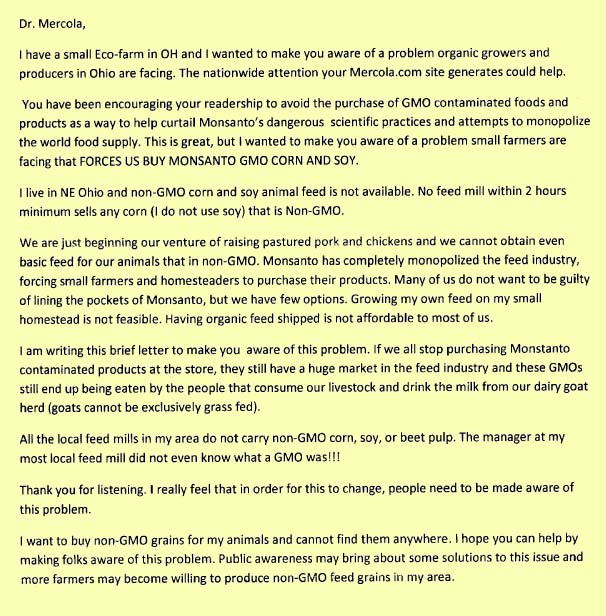Situation is Actually Worse than We Knew
Not only do we have the problems that have been previously discussed over the years with GM crops but there are some new elements to the equation. For now even those that are convinced of the dangers of GMO crops and want to avoid using them simply are unable to in some cases.
I recently received a personal letter from one such farmer, who runs a small ecological farm in Ohio. Even though she is dedicated to organic farming, she is now finding herself in the unthinkable predicament of being forced to buy Monsanto GM corn feed for her pigs and chickens.
Here is her story:

Be Part of the Solution
In spite of what you have likely heard, a large shift to organic agriculture -- which by definition is non-GM -- could protect and improve both the environment and animal- and human health.
It could even be the solution to world hunger. According to a Danish study presented to the U.N. in 2007, recent models of an organically grown, global food supply shows that a more environmentally friendly approach to agriculture is in fact capable of producing enough food for the world's current population.
What prevents many farmers from making the move to organic is that crop yields could initially drop as much as 50 percent in the very beginning, before evening out over time. However, that problem may be mitigated somewhat, because farmers wouldn't need to dole out precious money for toxic pesticides, the price of which have risen as much as 75 percent already.
Unfortunately, while we're waiting for the leaders of the world to catch up and realize the dire straits we're in as a species, we're running out of time. As evidenced by Cappello's story above, our ability to produce organic foods is under constant attack.
So, please, do not wait for some unspecified time in the future.
Instead, do what you can NOW to promote local organic food producers no matter where you live by taking advantage of local sources of organic foods as often as you can.
In addition, please take every measure you can to avoid as many GM foods as you possibly can. Here's a list of tips to help you do just that:
- Reduce or eliminate processed foods. Some 75 percent of processed foods contain GM ingredients.
- Read produce and food labels. When looking at a product label, if any ingredients such as corn flour and meal, dextrin, starch, soy sauce, margarine, and tofu (to name a few) are listed, there's a good chance it has come from GM corn or soy, unless it's listed as organic.
- Buy organic produce. Buying organic is currently the best way to ensure that your food has not been genetically modified.
- Download and use the Non-GMO Shopping Guide, and share it with your friends and family
Avoid purchasing Monsanto-made pesticides and herbicides for your home
Yes, very scary.
No comments:
Post a Comment